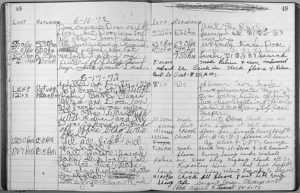Forty-eight years ago this evening, Watergate Office Building security guard Frank Wills changed American history for the better by doing his job well.
Here’s the log that he and then the next officer, on the day shift, kept. It shows Wills’s discovery that two doors on Basement level 2 had been wedged open, and that a door on B3 and another door were unlocked. It also shows that Wills called the District of Columbia police, who investigated and confirmed that a door had been taped open.
Here is my rough transcription of the handwritten log—Mr. Wills was not a perfect speller, but his log entries were solid, generally recording what he did and found on that momentous night shift:
[Handwritten entries by Watergate Security Officer Frank Wills:]
6–17–72
Wills on duty 12:00
Left Return B2 Level Stuffed With
12:05 12:20 AM Paper Both Doars
also one Doan on
B3 level was open
The other was stuff
with paper and the
Doar annex outside
Off office bldg. was
open
12:30 AM 1:00 AM Cut all lights out
In hall
1:47 AM 1:55 AM Call police found
tape In Doare Call
Police two make
A inspection on the
Inspection Police 25
Sir Sgt Jackson made
out RePort
5:22 AM 6:20 AM Secured all B1-B2-B3
Levels
6:25 AM 6:30 AM unlock trash doar.
6:30 AM 7:05 AM Levels B1 B2 B3 Secured
7:30 AM Levels B1 B2 B3 Secured
[Handwritten entries by a second person:]
8:00 AM Made reliev + men informed
about the Break in Check floors + return
Back to Desk – 8 55 (AM)
[Resumed handwritten entries by Officer Wills:]
8:00 9:00 officer came back
Two invesgiate Return
Two lobby. Wills off Duty
Two invesgiating officers
Carl Schaffler, Sgt. Paul
Leeper.
The D.C. police investigated inside the Watergate building, found five burglars in the offices of the Democratic National Committee, and arrested them.
Those burglars, in turned out, were working for President Richard M. Nixon—investigations established that his White House, his administration, and his reelection campaign had committed many serious crimes.
On August 8, 1974, President Nixon resigned from office.
A week later, Frank Willis appeared on a television show and told his story.
Thank you, sir, for your example.


